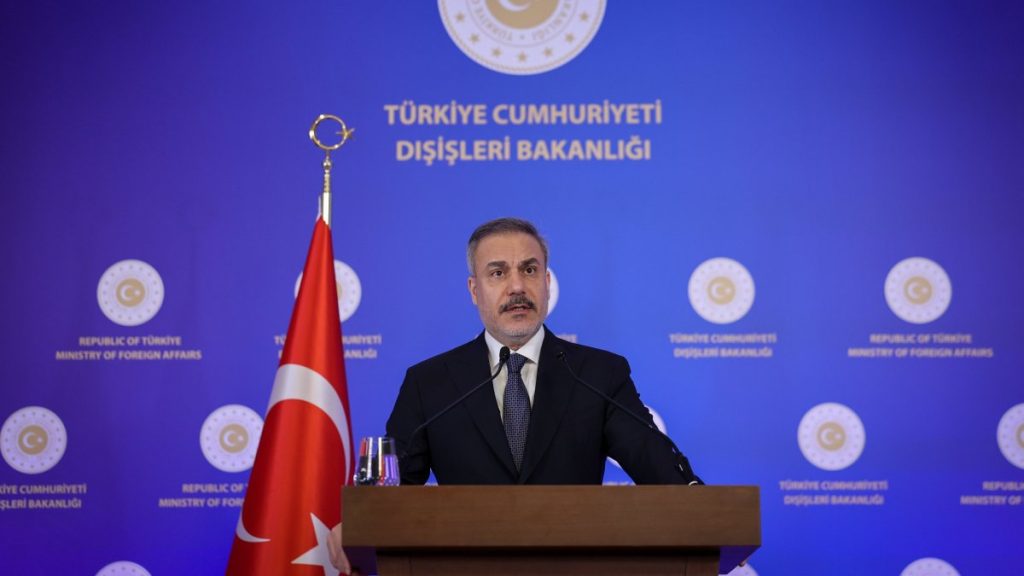Foreign Minister Hakan Fidan on Friday said Türkiye would launch an offensive in Syria against the PKK/YPG terrorist group “if it becomes necessary.”
Speaking at a press conference in Istanbul, Fidan said the new Syrian administration should be given an opportunity to address the presence of the YPG in the country, but reiterated that Ankara would act against them otherwise.
“We have said it repeatedly. We cannot live with such a threat (from PKK/YPG). Either someone else will take action, or we will,” he said.
Fidan said it was wrong to classify Türkiye’s battle against PKK’s Syrian offshoot, the YPG, as a battle against Kurds, adding Ankara was now evaluating its presence in Syria in light of the new situation there.
The end of the road is now in sight for the PKK/YPG terror group and its affiliates in Syria, Fidan said, noting that ridding Syria of terrorism would be among Türkiye’s key priorities in 2025.
He insisted Türkiye’s only aim was to ensure “stability” in Syria after the toppling of regime dictator Bashar Assad last month.
“Türkiye has no intention of taking over any part of Syria,” Fidan also said.
Ankara considers the YPG as linked to the PKK, which has waged a decadeslong terror campaign in Türkiye. The U.S. has called the PKK/YPG its primary ally in the fight against Daesh for over a decade now.
Türkiye has repeatedly said the PKK/YPG must disband themselves if they want a peaceful transition in Syria.
It has also long been bothered by the U.S. support of the PKK/YPG in Syria, considering the PKK is proscribed as a terrorist group by the European Union, the U.S. and Türkiye.
Fidan said Washington was Türkiye’s only interlocutor for developments in northeast Syria and urged France to repatriate its nationals jailed there in connection with Daesh activity.
Washington has been insisting on preventing a Turkish offensive against PKK/YPG in Syria. Ankara has mounted multiple operations against the YPG/PKK in Syria since 2016.
“The U.S. is our only counterpart for developments in Syria,” Fidan said, dismissing the concerns of other Western nations about the potential return of Daesh fighters to their own countries.
“Frankly we don’t take into account countries that try to advance their own interests in Syria by hiding behind U.S. power,” he said.
France, he said, was ignoring Türkiye’s security concerns by not repatriating French fighters of Daesh but leaving them to be guarded by the PKK/YPG.
“They have a policy, they do not bring Daesh prisoners back to their own countries. But they do not care about our security,” he said.
Asked about the possibility of a French-U.S. troop deployment in northeast Syria, he said France’s main concern should be to take back its nationals.
“If France had anything to do, it should take its own citizens, bring them to its own prisons and judge them,” he said.
Despite Washington’s insistence on the PKK/YPG’s crucial role in keeping Daesh terrorists at bay in northeastern Syria, Fidan said last month its only job was “keeping Daesh prisoners in jail.”
“Unfortunately, our American friends and some European friends are using a terrorist organization to keep the other terrorists in prison,” he said in an interview with France24.
US, EU, Ukraine
Fidan continued by saying that he did not expect any problems with the United States in counterterrorism in Syria despite its support for the PKK/YPG.
Türkiye will continue constructive and open dialogue with the new U.S. administration of President-elect Donald Trump, and hoped to continue the positive momentum between the two countries.
Fidan said Türkiye expected to work with the new administration on bilateral ties, Israel-Gaza, Ukraine and other issues, and hoped to see advances in those areas.
He also said Russia had taken a very rational decision when it cut support for Assad and that it could have militarily supported him in stopping the anti-regime advance.
On the state of EU relations, Fidan said he did not see a possibility of advancing talks on certain issues with the European Union under the bloc’s current political structure, but added that cooperation between the sides continued.
Türkiye has good ties with EU member states, but that ties with the bloc’s institutions are not as strong, he argued.
Türkiye has been a candidate for EU membership for over two decades, but talks stalled in 2016 over what Ankara says is the bloc’s “insistence on politicizing the issue.”
Türkiye suggests it has fulfilled most of the criteria for membership. Though the accession process stalled, the country has remained a key economic and defense partner for the 27-member bloc.


